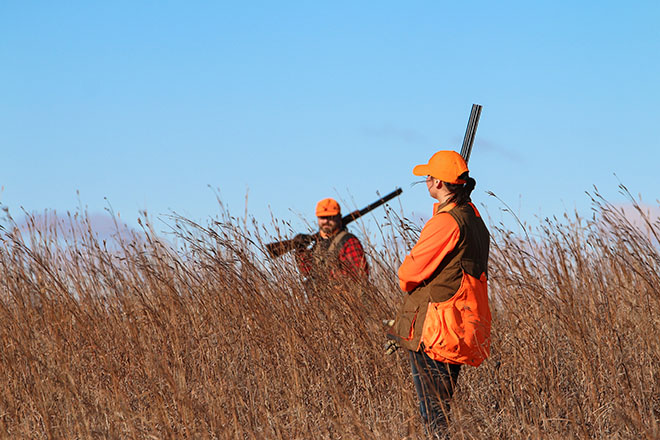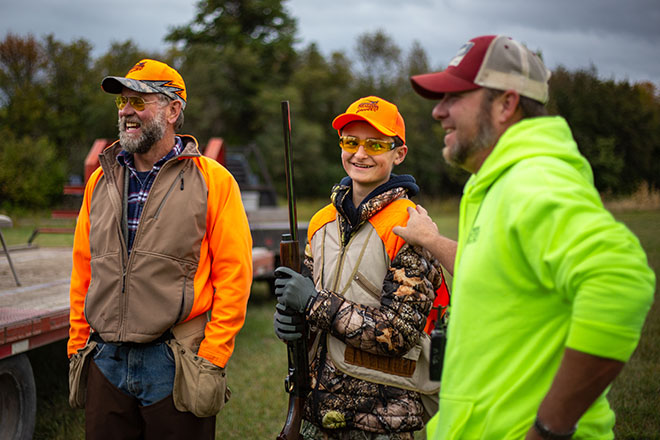Photo by Colby Kerber
It takes two people to build a bird hunter, our Hunting Mentor and Mentee Handbooks detail secrets for success from both sides of the relationship
Story By Emily Spolyar
When it comes to the relationship forged when one upland hunter takes another under the wing, the lives impacted start at two … and then, like the deep-reaching roots of native prairie grasses and wildflowers, over time that reach far surpasses the surface level. Regardless of which side of the equation you are on, the mentor/mentee relationship provides a challenging opportunity for growth. Both sides demand a level of vulnerability, open communication, and a willingness to both teach and learn. How special is it that we can change lives by sharing what we love? When done well, mentoring — and being a mentee — is a gift that gives for a lifetime.
 Photo by Logan Hinners
Photo by Logan Hinners
The hunting mentor handbook
A baseline on being a mentor who makes a positive impact
At some point, we’re all likely to play the role of mentor in one way or another, whether it’s with your children, a friend, or a new person looking for an experienced hunter to show them the ropes. Mentoring hunters is one of the most rewarding — albeit challenging — experiences in the outdoors. Keep these ideas in mind as you step into this new responsibility.
Set the Safety Tone
Set yourself and your mentee up for success by giving some serious consideration to the list of pre-hunt safety items. Let them know that while the experience should be fun, safety will always be the number one priority. Give a general overview of how the hunt will go, what to expect, and the safety considerations important to you, to keep in mind before hitting the field.
Clarify the Goal
The goals of a hunt may change when you have a mentee with you. Bagging game is icing on the cake, not the primary focus. Make it clear to your mentee that you are there to teach them how to hunt safely, responsibly and ethically — not to make sure they’re taking home a limit of birds.
Communicate Openly
Clear, open communication is a challenging skill to develop. “Am I doing this right?” is the ever-present question in a mentee’s mind. Do your best to foster open, honest lines of communication. Point out the things a mentee is doing well, along with pointing out areas where they could improve. Encourage the mentee to ask questions.
Commit to Being Selfless
In the limited days afield we get each year, being selfless is hard. It won’t be necessary with every hunt, but that initial trip with your mentee is a great time to focus solely on them, void of any distractions, which would include you shooting too. And remember to be ready to share extra gear as needed.
Teach Proper Etiquette
Hannah Hayes, education & outreach coordinator with Pheasants Forever, says one of the biggest learning curves for her was figuring out the do’s and don’ts surrounding field etiquette. “There are a lot of unspoken rules that seasoned hunters abide by,” she says. “Take a moment to think about these and teach your mentee beforehand. This will ensure they become a respectful hunter that yourself and others continue inviting afield.”
Have Patience, Patience, Patience
Did I mention patience? It’s big. Learning a new skill, especially as an adult, is intimidating. Keep in mind that a mentee is learning a plethora of new skills, from maneuvering the terrain to gun handling to meat processing. It’s a lot to take in! Let them struggle and fumble a bit, then coach plenty, but don’t take over and do things for them. Hands-on experience is the best teacher. Take a deep breath and be patient.
Embrace Mistakes
“Making mistakes is all part of learning the ropes, so mentor and mentee alike need to embrace that they will happen,” says Renee Tomala, a hunter’s education instructor as well as a senior field representative with Pheasants Forever in North Dakota. “Aside from safety, there is no one right way to do things in the field. We each figure out what works best for us. Even the most seasoned hunters don’t grace the sport with pure perfection. Be safe, laugh it off, learn from it.”
Build Their Community
A large part of the hunting world that life-long hunters take for granted is the strong community you’re surrounded by, filled with people who share your passions. These circles can be tough to gain access to as an outsider. Welcome your mentee into your community so they can start to build their own sense of belonging within the outdoors world. These relationships often open additional doors for them to learn and grow. Invite them to your local Pheasants Forever banquet and encourage them to get involved.
Empower Your Mentee
The ultimate goal of this relationship is for the mentee to feel empowered enough to at some point to head afield independently from their mentor. Sometimes, people may need a little extra push to get to that point. When the time comes, let your mentee know that you’ll be there when they need you, but remind them that they’re capable of finding their own success in the field without you.

The Hunting Mentee Handbook
A crash course in how to be a mentee who gets invited back
As an upland hunting mentee, it’s easy to feel overwhelmed by a lack of knowledge and experience with any new activity. Because of this, it’s easy to forget the simple things, like the concepts that follow. These important ideas will not only help you have a safe, enjoyable time together, they will also help encourage your mentor to take on additional aspiring hunters.
Be Punctual
Nothing says I appreciate your time to a mentor quite like showing up a bit early. It shows you’re excited to be there and that you respect the time and effort your mentor is putting into the hunt.
prepare for Conditions
Check the weather and dress accordingly. If you don’t know what’s appropriate or need to borrow gear, ask your mentor ahead of time. There’s nothing worse than cutting a hunt short because someone didn’t dress for the conditions. If you’re unsure, a good rule of thumb is to dress in layers that can be taken off and added back on.
Prepare Yourself
Take time to learn a few pieces of information about your intended quarry before the hunt. A quick Google search can help show your mentor you’re willing to put effort into gaining your own knowledge, not just relying on them to teach you everything. Purchase licenses well in advance and always make sure you read and know the rules and regulations for a hunt beforehand.
Ask Questions
First, check that it’s an appropriate time to ask questions. When it is, go beyond the surface level and make sure you’re asking questions for which the answers will help you walk away feeling well-armed for future pursuits without your mentor. Questions make it clear that you’re not there to ride any coattails, you’re there to learn enough to branch out on your own.
Ask for Feedback
Ask your mentor for feedback periodically so they have a chance to let you know how to improve. Telling someone they’re not doing something quite right can be uncomfortable, so give them opportunities to do.
Ask to Help
A simple How can I help? whether it is before, during or after the hunt, shows your willingness to be a team player and gives you more chances for valuable hands-on experience.
Follow Up
“It’s okay to ask questions after the hunt too, when you have had some more time to process what you’ve learned,” says Marissa Jensen, education & outreach program manager for Pheasants Forever. “Ask your mentor what’s on your mind after the hunt, or if there are additional resources they would recommend that could help you learn more.”
Listen and Pay Attention
Observe the area around you and soak in all there is to see, hear and feel. Watch how your mentor maneuvers through cover and what habitat features they are targeting. Try to absorb as much information as you can and apply that to your behavior as you go. Make note of routines they go through pre- and post-hunt. What equipment do they use that you may need to get yourself?
Bring Refreshments
If you’ve spent any time in the field, especially during adverse weather, you know how satisfying a hearty meal, a cup of coffee, a cooler of drinks or some sweet treats can be. Bringing along refreshments for the group may seem small, but it makes a big impact. Breakfast sandwiches and a thermos of coffee and jug of juice as you’re waiting for shooting light could be part of the ticket to getting future invites.
Send a Thank You
A hand-written thank-you note is in order. Be timely with your appreciation and specific when it comes to referencing lessons learned and memories made. Acknowledge the time and effort put forth by your mentor. Later, share success stories from hunts and activities from outside of those you do with your mentor. Mentors love seeing how their mentee applies what they learned; it is one of the great rewards of mentoring.
Emily Spolyar was once a hunting mentee, and now returns the gift as an upland mentor to others. She is a precision ag & conservation specialist for Pheasants Forever in North Dakota.
This story originally appeared in the 2022 Winter Issue of the Pheasants Forever Journal. If you enjoyed it and would like to be the first to read more great upland content like this, become a Pheasants Forever member today!